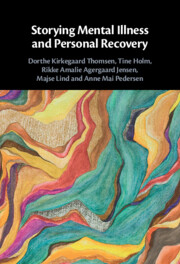Book contents
- Storying Mental Illness and Personal Recovery
- Storying Mental Illness and Personal Recovery
- Copyright page
- Contents
- Figures
- Tables
- Acknowledgments
- Chapter 1 Introducing the Book
- Chapter 2 The Science of Mental Illness
- Chapter 3 Vulnerability, Stress, and Burden in Mental Illness
- Chapter 4 Recovery and Mental Illness
- Chapter 5 Narrative Identity
- Chapter 6 Narrative Identity, Illness, and Well-Being
- Chapter 7 How Did We Collect and Analyze the Life Stories?
- Chapter 8 Overview of Narrative Identity Themes from the Initial Analyses
- Chapter 9 Relationship Themes in Narrative Identity
- Chapter 10 Self Themes in Narrative Identity
- Chapter 11 Functional-Level Themes in Narrative Identity
- Chapter 12 Treatment Themes in Narrative Identity
- Chapter 13 Summary and Synthesis
- Chapter 14 Understanding the Interplay between Narrative Identity and Mental Illness: A Framework
- Chapter 15 Tools for Narrative Repair
- Conclusion
- Book part
- References
- Index
Conclusion
Published online by Cambridge University Press: 02 February 2023
- Storying Mental Illness and Personal Recovery
- Storying Mental Illness and Personal Recovery
- Copyright page
- Contents
- Figures
- Tables
- Acknowledgments
- Chapter 1 Introducing the Book
- Chapter 2 The Science of Mental Illness
- Chapter 3 Vulnerability, Stress, and Burden in Mental Illness
- Chapter 4 Recovery and Mental Illness
- Chapter 5 Narrative Identity
- Chapter 6 Narrative Identity, Illness, and Well-Being
- Chapter 7 How Did We Collect and Analyze the Life Stories?
- Chapter 8 Overview of Narrative Identity Themes from the Initial Analyses
- Chapter 9 Relationship Themes in Narrative Identity
- Chapter 10 Self Themes in Narrative Identity
- Chapter 11 Functional-Level Themes in Narrative Identity
- Chapter 12 Treatment Themes in Narrative Identity
- Chapter 13 Summary and Synthesis
- Chapter 14 Understanding the Interplay between Narrative Identity and Mental Illness: A Framework
- Chapter 15 Tools for Narrative Repair
- Conclusion
- Book part
- References
- Index
Summary
Too little research has addressed how individuals with severe psychopathology experience the consequences of their illness and what brings well-being in their lives. Anchored in the assumption that individuals make sense of their lives and build identity through narrative, we explored life stories of 118 individuals with severe mental disorder to answer these questions. We found that individuals story their mental illness with a range of costs to relationships, selfhood, and functional level, and that some individuals experienced aspects of treatment as an additional burden. These costs can turn into a web of negative identity conclusions, such as “I am out of control,” “I have to hide who I am,” “I am a failure with no purpose because I can’t work,” “I am a burden,” “I am too difficult to be with,” and “I am harmed by treatment.” At the same time, our participants shared well-being stories revolving around relationships as supportive, loving, and nourishing; and the self as mastering, growing, and dreaming. Many of these stories were shared in the broader context of education, vocation, leisure activities, and treatment. As counterweights to the toxic identity implication flowing from costs of mental illness, these well-being stories carried adaptive narrative identities fostering personal recovery: “I can help others who are in pain,” “I can love and others can love me,” “I can make good decisions,” “I can do well at study/work,” and “I can become better with the help of others.”
- Type
- Chapter
- Information
- Storying Mental Illness and Personal Recovery , pp. 229 - 230Publisher: Cambridge University PressPrint publication year: 2023



